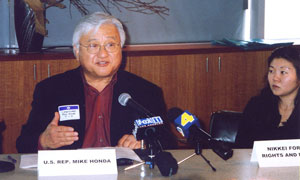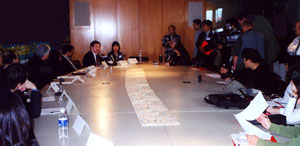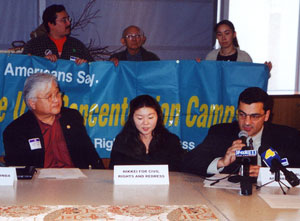Press Conference:
Representative Mike Honda Questions why the Republican party has not criticized
pro-internment statements. Community groups reiterated calls for Coble to step down.
 |
|
Mike Honda speaking at Press Conference
|
Flanked by former internees and leaders of civil rights organizations, Rep. Mike Honda (D-San Jose) on Saturday called for the Republican Party to hold North Carolina Rep. Howard Coble responsible for comments he made endorsing the internment of Japanese Americans during World War II.
The congressman commented that Republicans on Capitol Hill have been slow to criticize Coble, unlike criticism directed at Senator Trent Lott after he endorsed the 1948 segregationist presi-dential campaign of Senator Strom Thurmond.
“As soon as Trent Lou made his com-ments about his revered senator, Presi-dent Bush came out very adamantly, aligning himself against those com-ments,” said Honda. “The Republican leadership has not done that and has been notably very silent on this—and it is very curious.”
Coble, chair of the House Judiciary subcommittee on crime, terrorism and homeland security, has refused to step down from his chairmanship or meet formally with Asian American mem-bers of Congress. In a Feb. 4 radio in-terview he said, “We were at war. They (Japanese Americans) were an endangered species. For many of these Japanese Americans it wasn’t safe for them to be on the street.” He later issued a statement clarifying his position, but still insisting that President Roosevelt made his decision based on what “he felt was in the best interest of national security.”
 |
|
Press conference
|
Joining Honda at the press confer-ence, were Kei Nagao, Nikkei Coalition for Redress and Reparations; Ken Inouye, Pacific Southwest District Japanese American Citizens League; Salam Al-Marayati, executive director, Muslim Public Affairs Council; Bill Watanabe, Little Tokyo Service Center; Stacy Toda, Organization of Chinese Americans; Guy Aoki, Media Action Network for Asian Americans; Frank Emi, wartime draft resister; Jim Matsuoka, a former internee at Manzanar; as well as representatives from the Japanese American Bar Association, Japanese American Cultural Community Center and Visual Com-munications.
The groups reiterated calls for Coble to step down as chair of the House subcommittee and expressed concerns that his statements reflected the eroding of civil liberties in American society.
“When you have ignorance com-bined with power that is the most dan-gerous formula you can have to lead our country,” said Al-Marayati. “As chair of this committee for homeland security it is no wonder that our policy on home-land security is a mess. We have suffered from 9/11 as an American people. Now we are suffering from hysteria, and prejudice, and lack of leadership. What took place 60 years ago, it is taking place again today.”
Matsuoka commented that Coble is a victim of “foot in mouth disease.”
 |
|
Salam al-Marayati of Muslim Public Affairs Council
|
“I was in prison in Manzanar for no other reason than my race. And I can’t help but feel put off by the comments of Representative Coble. Our family lost what little we had. My father’s life savings and bank account were wiped off the books. We lost all of our rights as citizens and for years following the war, we lived in abject poverty, paying for crimes that we never committed,” Matsuoka said.
Honda noted that he has introduced a resolution on Executive Order 9066 and is hopeful that Coble will sign on to the bill.
“We are still looking for a formal meeting with him. I have met with him informally and spoken with him for about 15 minutes. My sense is that there is some movement in his under-standing, but there is this great need, on his part, to continue to say that he feels that President Roosevelt had done the right thing in his own mind,” said Honda.
The San Jose congressman declared that the issue has underscored the ne-cessity that Japanese Americans con-tinue to speak out on the internment.
“The reason why it is so important that Japanese Americans, Nikkeis especially, speak out today and speak out tomorrow and into the future is that we have to have this continuous learn-ing mode to make sure the other policy makers and other members of our so-ciety continue to learn what it is that we suffered, what lessons that were learned through our efforts in repara-tions, and the lessons we learned about the importance of the Constitution,” Honda said.
Reprinted from the Rafu Shimppo
BY JORDAN IKEDA and GWEN MURANAKA
|

